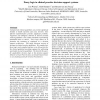Free Online Productivity Tools
i2Speak
i2Symbol
i2OCR
iTex2Img
iWeb2Print
iWeb2Shot
i2Type
iPdf2Split
iPdf2Merge
i2Bopomofo
i2Arabic
i2Style
i2Image
i2PDF
iLatex2Rtf
Sci2ools
141
click to vote
HICSS
2000
IEEE
2000
IEEE
Fuzzy Logic in Clinical Practice Decision Support Systems
Computerized clinical guidelines can provide significant benefits to health outcomes and costs, however, their effective implementation presents significant problems. Vagueness and ambiguity inherent in natural (textual) clinical guidelines is not readily amenable to formulating automated alerts or advice. Fuzzy logic allows us to formalize the treatment of vagueness in a decision support architecture. This paper discusses sources of fuzziness in clinical practice guidelines. We consider how fuzzy logic can be applied and give a set of heuristics for the clinical guideline knowledge engineer for addressing uncertainty in practice guidelines. We describe the specific applicability of fuzzy logic to the decision support behavior of Care Plan On-Line, an intranet-based chronic care planning system for General Practitioners.
Related Content
| Added | 31 Jul 2010 |
| Updated | 31 Jul 2010 |
| Type | Conference |
| Year | 2000 |
| Where | HICSS |
| Authors | James R. Warren, Gleb Beliakov, Berend-Jan van der Zwaag |
Comments (0)

